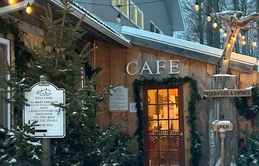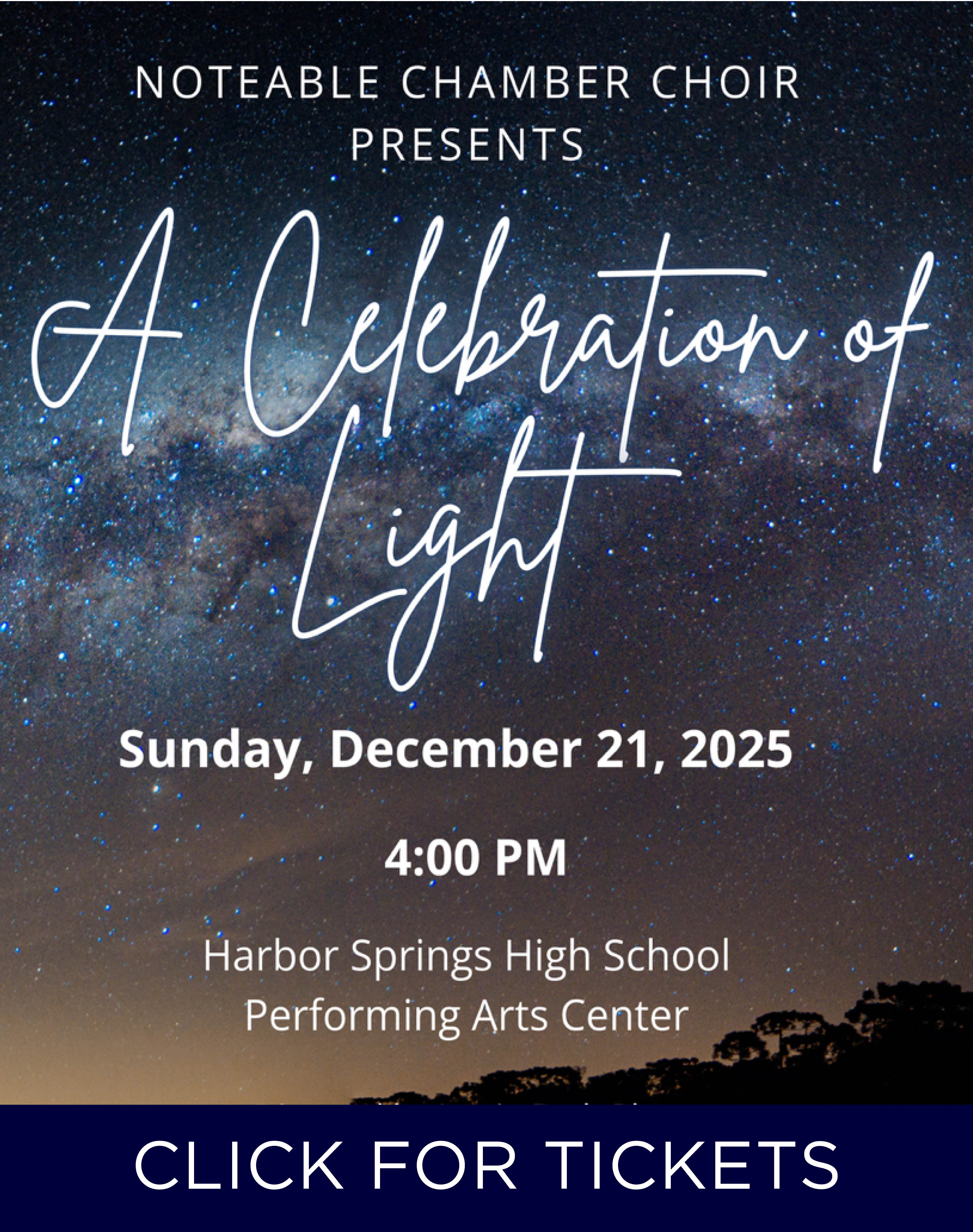Dr. Pulp Fiction
Garyn Roberts delves deep into mystery & science fiction
July 8, 2012

When science fiction writer Ray Bradbury died last month, the world mourned the loss of a literary giant.
Northwestern Michigan College professor Garyn Roberts mourned the loss of a friend.
Roberts, an English instructor at Northwestern Michigan College, has been working on a biography of Bradbury and grew close to the author over the years. Recently, the Express sat down with Roberts to talk about Bradbury, science fiction and other literary forms that grew out of the "pulp" publications of the early 20th Century.
Northern Express: How did you become friends with Ray Bradbury?
Garyn Roberts: It was a little over 30 years ago, the spring of 1982. I was in graduate school working on my Masters degree, and Bradbury came to Bowling Green. He and a mutual friend of ours, Bill Nolan, (Bill is known for a lot of things, but is probably best known as the author of "Logan’s Run," the famous novels and television series) he had come to Bowling Green to donate a lot of Ray’s original manuscripts to special collections because Bowling Green was -- it still is -- the world headquarters for popular culture studies. Ray brought all kinds of original manuscripts, including the original manuscript for "Fahrenheit 451."
I actually had a 15-week graduate course on Bradbury’s life and works, although I’d read his stuff as a kid years before, and when he arrived, he and Bill drove from California in an old station wagon with a carload full of manuscripts.
I got to spend some nights and days with him. I had kind of unique access to him because I was a graduate student and got to know him. From then on we were good friends through the years.
NE: You’ve been working on a Bradbury biography. How is that going and can we expect to see it in bookstores sometime soon?
Roberts: I’ve got several hundred pages of manuscript, all kinds of unique items. I will finish that one day.
There are four or five biographers out there through the years who have worked on Bradbury, who are considered kind of the authorized biographers. I guess I’d be in that group"¦ And I’ve been fortunate to do lots of things with Ray over the years, too.
NE: He was cooperative with you and the work you were doing?
Roberts: Oh, not only cooperative, he was supportive. He’s been a very, very good friend. And I think the one thing I would say about him, even more than how much he’s affected people, as just a good man with a vision who loved life and just an all around great guy, was that he was so good to my students through the years. We would write him and he would write us back.
In later years, of course, that tailed off a little bit, because he died last month at 91, so his health was failing for a while. But he used to send letters to my classes and I got phone calls from him and emails and lots of signed books personalized to me. So I’ve got years worth of research and things saved from him and he was always just a sweetheart of a man, just a very, very nice man.
Between 2003 and 2005, Ray joined me for a series of community reading projects around the Midwest. The focus was a fifty-year celebration of his novel, "Fahrenheit 451." These were very popular -- I was the featured speaker and Ray joined me via teleconference from his home in Los Angeles.
NE: You named "There Will Come Soft Rains" as among your favorite Bradbury stories. That was published in 1949 and described a home after its family is lost in a nuclear apocalypse. The story is also set in 2006, and describes what Bradbury thought life would be like in that year. It seems like he got a lot of things right, like the pervasiveness of computers in our lives. What do you think about his long-ago vision of the future?
Roberts: Wow. There’s lots going on in that story. That story first appeared in 1949; it was actually written a year or two before that, and it appeared in a Canadian magazine and was later incorporated in "The Martian Chronicles" in 1950.
Bradbury was reacting, of course, to World War II and to the early days of the Cold War era and nuclear holocaust. And he drew upon a poem from the 19-teens or "˜20s, by a lady named Sara Teasdale. The poem was called "There Will Come Soft Rains," and the poem encapsulated the entire story.
So it’s a story about a house, right?
A mechanized house, a mechanical house, where all the people are dead. They’ve died from the nuclear holocaust, the mother and father and the daughter and the son are all burned into the walls, their images are burned from the blast on the outside of their house, and the house goes on, because it’s computerized.
Ray often said he and George Orwell and others like them wrote those stories not to predict the future, but to prevent the future. So a lot of people would come and say, "˜How did you know this was going to happen?’ and all that kind of thing, and he’d say, "˜Well, you take what you know at the time and you extend it.’ So throughout his life he was able to write stories about lots of things that did come true, and if you think about some of the robot mechanical mice and the mechanized house of "There Will Come Soft Rains," all you have to do is go to one of our big box stores, a Home Depot or Menard’s or whatever, and you can see the little vacuums that run mechanically around the house. That’s what he was writing about some 60 years ago.
NE: You’re a really accomplished fan of science fiction and fantasy writing. What did you find appealing about that kind of work in the first place?
Roberts: I don’t know. I’ve always liked it. I’m also a big fan of mystery fiction. I’ve written books on mysteries, biographies of mystery writers.
I’ve collected a lot of pulp fiction in book form; I’m working on one right now, last night I finished the introduction to a new book that’s coming out, it’s a cross between detective fiction and science fiction.
Ever since I was a little kid I was fortunate to be nurtured by parents who loved reading. It was the pre-computer era; there’s nothing wrong with computers, in a general way, but literacy was different in those days than it is today.
So I’ve always been exposed to it. Today I’m going to make my weekly trip down to the comic book shop, Top Comics, and see Mike and Doug, two of the great guys in all of Traverse City, and what they do for this town in terms of culture and art.
People who make fun of comics and pulp fiction don’t understand them. So I get a little bit defensive when anybody talks about pop culture or whatever as being an inferior kind of culture. Some of our most important writing and art today is being done in comic art and science fiction, speculative fiction, all that kind of stuff.
NE: You edited a collection of 200 years of fantasy and science fiction, "The Prentice Hall Anthology of Science Fiction and Fantasy." How did you become such an authority on the subject?
Roberts: That earned the National Popular Culture book award. It’s been used throughout the world. I’ve been part of two nominations for the Mystery Writers of America Edgar Award, so I’ve done a lot of work in mystery fiction as well. I’m considered one of the top experts on Dick Tracy, and Chester Gould (the creator of Dick Tracy) was a friend of mine when I was a kid.
There are so many neat things in life, and I think that’s where I find some inspiration from Bradbury, as well. He wanted to make it to 100 and of course he didn’t, but he didn’t waste a moment of his life. He often said he wanted to just keep going and do everything he could. There is so much to live for and do.
We’re living in a golden era for science fiction and pulp fiction because people are rediscovering it and so much of it is being republished right now. We’re discovering all of this golden age stuff from the early 1900s, the Depression-era, World War II-era.
NE: In the introduction to your science fiction fantasy anthology, you talk about the tradition of great science fiction writers starting out writing serialized stories for "dime novels" and later "pulp" magazines. Those later got replaced by paperbacks. With the state of publishing today, where do you think the science fiction writers of the future are getting published today?
Roberts: Where they are getting published could be a variety of different places. There’s quite a market for publishing.
Some are self-publishing on the Internet.
Some very famous authors do that themselves, and they run drafts of their early work past their fans to see what they like. Orson Scott Card has been famous for that for 15, 20 years, where he will publish online the next chapter to his book and see what the fans think about it and then he’ll adjust it. It’s actually quite ingenious to do it that way.
But there is a lot of rediscovery of this kind of stuff and speculative fiction has such an application to social issues: to where we are, to where we are going. One of the popular genres these days in science fiction is a thing called Steampunk, which is a rediscovering of late- 1800s mechanical men and Jules Verne and H.G. Wells kind of stuff. That’s a lot of fun.
NE: Earlier you mentioned "pulp fiction." What does that mean?
Roberts: We could spend hours talking about it. I’m unashamedly a fan as well as an academic. There is a nice balance you can achieve; you don’t have to be just a fan or a snobby scholar, you can be in between.
You mentioned dime novels. Dime novels were the first entertainment medium in this country other than newspapers. They came about full force right around the time of the Civil War, although there had been early beginnings of them in the 1830s. Dime novels lived from about 1860 to around the World War I era. Approximately around 1920 they ended.
In the 1890s a new medium emerged due to all different kinds of changes in publishing, public wants and desires, and it was called a pulp magazine. A pulp magazine was designed to do some things that were different than the dime novel: take the strengths of the dime novel, and then expand upon them.
Pulps were named for the paper they were made out of -- pulp paper. It was a very cheap, coarse, highly acidic paper, and it was never meant to last. It was supposed to be an ephemeral entertainment made out of pulp wood. And the term "pulp," indicating a lesser kind of paper, translated to come to mean a lesser kind of fiction or literature. And there was some truth to that, because in all writing, there is success and conversely there’s lack of intellectualism, I don’t care who’s doing it.
But, it turned out to be the great training ground for a lot of very famous authors. Bradbury started there, Tennessee Williams, so many very, very famous, talented, talented writers began in the pulp wood era.
NE: Have you tried to write fiction yourself?
Roberts: I haven’t written a lot of fiction. I do have a couple of things underway, one that I want to have finished pretty soon, it’s just a short story, but it’s a tribute to Bradbury I started 10, 15 years ago. It’s a story in his kind of tradition that I am looking forward to finishing.
And I’m working on a couple of other projects that are quite exciting right now, so I always have something going.
NE: You’ve been at NMC since 1994.
How did you wind up here?
Roberts: I have taught for 31 years. I started in graduate school right about the time I met Bradbury at a very young age, I was 22 when I started teaching.
I got my doctorate when I was 27. I taught for five years in graduate school, a year out at a university in Minnesota. And then I had a chance to come to Michigan State where I spent seven years as an assistant professor, from "˜87 to "˜94, and in "˜94 I decided to come north, so I’ve been here for 18 years.
NE: What classes do you teach at NMC?
Does science fiction or fantasy play any part in the classes you teach?
Roberts: I teach a lot of second semester comp, English 112, research kinds of things. I love research, that’s a lot of what I publish and do. And then I have a science fiction class, which is wildly popular.
The students that wind up in the science fiction class, some are hardcore fans, and some know nothing of the subject and every one of them, I’ve got to believe, has just a really wonderful experience. Each night we start class early, we run class late, we have such enthusiasm there, I just live for it.
NE: The students are surprised at how engaging the material is?
Roberts: Absolutely. And discovering it.
And enjoying it. And realizing that they have a connection to it. That’s really rewarding for me. In the fall I teach a detective fiction class as well, it’s similarly popular, and there’s so many neat things there, too.
The best thing about any of this is the students -- the people of different ages. The students are tops. They’re what keep me going.
Trending

Farm to Glass with Ethanology
When Elk Rapids distillery Ethanology committed to locally-sourced ingredients for their products, it seemed like they&rsquo… Read More >>
MRKT HLDY SHPPNG, aka Warehouse MRKT Holiday Shopping!
Shop the latest from local makers and vendors at the Holiday MRKT Share at Warehouse MRKT in TC, Saturday, Dec. 20, from 10a… Read More >>
Men and Ugly Sweaters
Those two things don’t always go together, but on Dec. 19, you’ll see both out and about in Petoskey and Harbor … Read More >>


